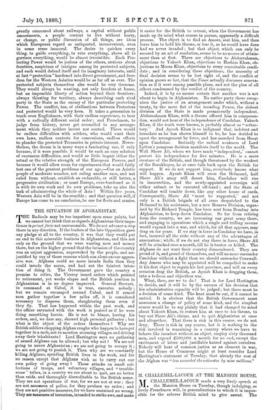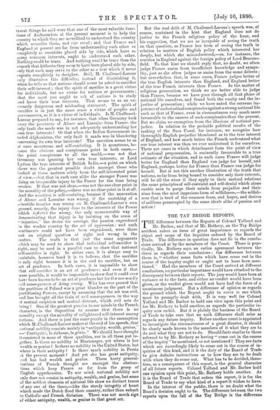M. CHALLEMEL-LACOUR AT THE MANSION HOUSE.
111 CHALLEMEL-LACOUR made a very lively speech at
• the Mansion House on Tuesday, though indulging, as lively Frenchmen will, in generalisations to which it is impos- sible for the soberer British mind to give assent. The truest things he said were that one of the most valuable func- tions of Ambassadors at the present moment is to help the country to which they arc accredited to understand the country which accredits them, and rice verscl ; and that France and England at present are far from understanding each other as completely as countries placed side by side, which have so many common interests, ought to understand each other. Nothing could be truer. And nothing could be truer than the remark that hitherto they seem to have been placed side by side, only that each may serve to the other as a text which it never expects completely to decipher. Still, M. Challemel-Lacour only illustrates this difficulty, instead of diminishing it, when he tells us that nations should never be asked to sacrifice their self-interest ; that the spirit of sacrifice is a great virtue for individuals, but no virtue for nations or governments ; that the most you ought to ask of nations is to study and know their true interests. That seems to us an ex- tremely dangerous and misleading statement. The spirit of sacrifice is in just the same sense a virtue of peoples and governments, as it is a virtue of individuals. Is M. Challemel- Lacour prepared to say, for instance, that when Germany took away the provinces of Alsace and Lorraine from France, the only fault she made was in not adequately understanding her own true interests ? Or that when the Indian Government in- vaded Afghanistan, the only fault it made was in blundering concerning its own true interests ? The assertion seems to us at once monstrous and self-confuting. It is monstrous, be- cause the obvious and conspicuous point in both cases,— the point conspicuous to all the world,—was not that Germany was ignoring her own true interests, or Lord Lytton the true interests of British India,—a point on which there was the greatest possible doubt amongst those who looked at these matters solely from the self-interested point of view,—but that in each case alike the stronger Power was doing an irreparable injury to the Power for the time being weaker. If that was not clear,—was not the one clear point in the morality of the policy,—there was no clear point in it at all. And the assertion is self-confuting, because if the annexation of Alsace and Lorraine was wrong, if the snatching of a scientific frontier was wrong on M. Challemel-Lacour's own ground, namely, the injury done to the interests of the Power which inflict el the wrong, the only unanswerable way of demonstrating that injury is by insisting on the sense of injustice," the desire for revenge, the passion engendered in the weaker country by the act of oppression ; and such sentiments could not have been engendered, were there not an original question of right and wrong in the matter. The truth is that just the same arguments which may be used to show that individual self-sacrifice is right, may be used in a parallel case to show that national self-sacrifice is right. In either case, it is always easy to maintain, however hard it is to believe, that the sacrifice is only right because it is in the end no sacrifice, but an act of prudence. In both cases, it is impossible to show that self-sacrifice is an act of prudence ; and even if that were possible, it would be impossible to show that it could ever have been known to be an act of prudence but for the necessat ily evil consequences of doing wrong. Who has ever proved that the partition of Poland was a great blunder on the part of the partitioning Powers, except by assuming that the act was evil, and has brought all the train of evil consequences, in the way of mutual suspicion and mutual distrust, which evil acts do bring ? One of the greatest puzzles to our minds in the French character, is the disposition to assume that there is no morality except the morality of enlightened self-interest among nations. And there is just the same puzzle in the assumption which M. Challemel-Lacour makes at the end of his speech, that national nobility consists mainly in "antiquity, wealth, genius," —" l'antiqui tt:, in richesse, le enie." We should have thought it consisted in none of these qualities, nor in all these put to- gether. Is there no nobility in Montenegro. yet where is her wealth or genius? Is there no nobility in the United States, but where is their antiquity ? Is there much nobility in Persia at the present moment ? And yet she has great antiquity,
and has had wealth and genius. These hasty general- isations of French thought are amongst the obstruc- tions which keep France so far from the grasp of English apprehension. To our mind, national nobility not only does not consist in antiquity, wealth, and genius, but some of the noblest elements of national life show no distinct traces of any one of the three,—like the sturdy integrity of heart which made the Dutch flood their country, rather than submit to Catholic and Freneh dictation. There was not much sign of either antiquity, wealth, or genius in that great act.
But the real drift of M. Challemel-Lacour's speech was, of course, contained in the hint that England does not do justice to the French religious policy of the hour, and his suggestion, that we are as incapable of seeing the truth on that question, as France has been of seeing the truth in relation to matters of English policy which interested her deeply, but which she misunderstood,—as, for instance, the reaction in England against the foreign policy of Lord Beacons- field. To that hint we should reply that, no doubt, we often judge France amiss from insufficient knowledge and sympa- thy, just as she often judges us amiss from the same defects ; but nevertheless that, in some cases, France judges better of the true English interests than England, and England better of the true French interests than France. In the matter of religious persecution, we think we are better able to judge than France, because we have gone through all that phase of national life ourselves, and found both the vanity and the in- justice of persecution ; while we have noted the extreme im- potence of ecclesiastical conspiracies against a strong national life such as that of France, even in circumstances very much more favourable to the success of such conspiracies than the present. But we claim no exemption from the illusions of national pre- judice. In relation to the probable political results of the making of the Suez Canal, for instance, we recognise how thoroughly English prejudice blundered as to the true interest of England, and how much better the French understood what our true interest was than we ever understood it for ourselves. There are cases in which detachment from the point of view of national prepossession, is eminently favourable to a true estimate of the situation, and in such cases France will judge better for England than England can judge for herself, and England, perhaps, better for France than France can judge for herself. But is not this another illustration of the truth that nations, so far from being bound to consider only their interests, will be all the wiser if they apply to their mutual relations the same principles of self-restraint and self-denial which alone enable men to purge their minds from prejudice and their aims from the most imperious form of selfishness,—the selfish- ness that is bred of the common fears, and hopes, and desires of millions preoccupied by the same ideals alike of passion and action ?



































 Previous page
Previous page